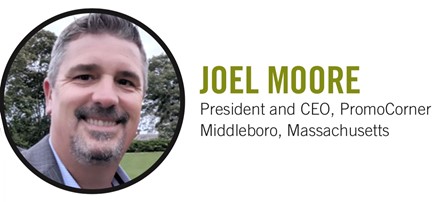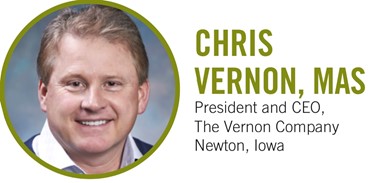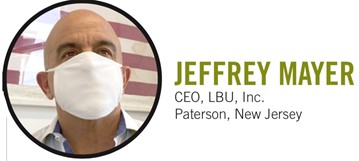Hangin' Tough

When reports of coronavirus first hit TV news stations and concerns grew about business and school closures, the spread of the disease and what it meant for the nation’s economy, the promotional products industry, along with many others, plunged into the unknown. Leaders were tasked, seemingly overnight, with guiding their employees through this extraordinary time—and to do so boldly and quickly while making some of the most difficult decisions of their careers. The last time the United States faced anything remotely comparable to the coronavirus outbreak was nearly 100 years ago with the Spanish flu in 1918—a virus that spread to infect 500 million people, or one-third of the world’s population.
But despite the immense uncertainty that lies ahead, leaders are pressing on, making the hard decisions that are needed to continue supporting their staff, their businesses and the industry. Read on to learn how three leaders made game-changing decisions to retrofit manufacturing processes, adapt to the growing reliance on digital technology, provide thought-provoking education opportunities and continue to recognize employees’ achievements during this time.
–––––––––––––––––––––––––––––––––––––––––––––––––––––––––––

The coronavirus pandemic has caused a slew of event cancellations and postponements spanning all industries—many of them affecting promotional products businesses. When the stay-at-home orders were issued in March, people were no longer working together, socializing, attending events and conferences, or networking. Joel Moore, president and CEO of industry business services provider PromoCorner, immediately saw a way to bring the industry together during this time by creating PromoShow, an on-demand, videoconferencing platform that allows distributors and vendors to “meet” face-to-face, in a virtual space.
Moore, who describes his digital marketing and media company PromoCorner as a “virtual workplace,” has used videoconferencing and messaging services for years. After learning about the impending lockdown, he says, he knew he needed to do something. “It has been a great distraction to work on this project,” he admits. “It provided me with an outlet to stay focused and busy, and afforded me the opportunity to fill a void and make a difference.”
Using PromoShow, vendors can set their own schedules to determine when they appear active on the site. If active, or present, videoconferencing can take place at the click of a mouse. If vendors are not present, distributors can request private meetings with them through the website. Vendors can also upload pre-recorded content, along with digital catalogs and any current offerings they may have. There are also plans for PromoShow to add a chat feature, Moore says, which will allow distributors and vendors to directly communicate outside of meetings. “We truly believe the possibilities for this medium are endless as we move forward.”
Together with a team, Moore began working on the PromoShow website on March 20, and went live just four days later. He says that from PromoShow’s launch through late April, the website attracted more than 8,000 visitors and 40,000 pageviews, and registrations are growing. He believes the platform will be relevant even after the pandemic and he will continue adding “themed shows and room shows throughout the year,” with hopes for a signature event later this year. “Ultimately, we hope to create a single portal for communication for the entire industry, virtually,” says Moore.
In addition to videoconferencing and meeting capabilities, PromoShow also publishes weekly content, including Unscripted LIVE! and Industry Insider, which feature live discussions, via videoconferencing, between promo professionals and special guests; The Promo Music Roundtable, a fun listen where promo pros discuss what their dream band would look like; and Express Training Bites, where pros share their tips, tricks and strategies related to industry topics. Moore says there are plans to offer an in-depth education series later in the summer and to continue introducing content into the fall.
–––––––––––––––––––––––––––––––––––––––––––––––––––––––––––

The coronavirus pandemic and related stay-at-home mandates forced companies and employees to change the way they communicate. One of the greatest shifts has been toward using digital technology for staff, team and client meetings, along with other events like virtual breakfasts, lunches and happy hours to keep staff engaged. Before the pandemic, The Vernon Company had been planning its annual national sales meeting, a conference that has been held at a different location in the U.S. every spring for decades. But it was clear that major changes were needed to keep the traditionally in-person conference—which was scheduled to be held in Charleston, South Carolina—up and running. The distributor acted quickly, while adhering to the stay-at-home and six-foot social distancing mandates, by hosting the conference online.
The conference, which is held to recognize the company’s salesforce and is attended by about 200 account executives and suppliers, provided attendees with live education sessions, which included up-close-and-personal sessions with new salespeople, small group roundtable discussions with supplier partners, morning coffee sessions and a virtual trade show featuring The Vernon Company’s top supplier partners. Using the videoconferencing platform Zoom to connect with attendees, The Vernon Company made the decision to migrate the event from in-person to online in just two weeks. Initially, the company was planning to cancel it.
“We had the entire trip planned, we saw [the coronavirus] happening, we knew people were already telling us they wouldn’t travel, and so we decided to cancel it,” says Chris Vernon, president and CEO of The Vernon Company.
But with the input of the company’s sales management team, the company decided to host its three-day event over the course of a week, breaking up the events into more digestible segments, beginning on Monday, April 27, by recognizing Million Dollar Club members—salespeople whose sales for the year exceeded $1 million. During the award ceremonies held throughout the week, attendees were asked to dress up. “We made it appear like we were on stage,” he says.
It was certainly a difference from the April 2019 conference, which was held at Paradise Point Resort in San Diego, California, and opened with a group competition on the beach. But nonetheless, Vernon says the response from the sales team and suppliers was very positive. “It was off the charts. We’ve never done anything virtual like this to this kind of scale,” he says. “We didn’t hear any negativity. With over 100 people involved, everyone was really complimentary. They understood we put this together in two weeks.”
During this year’s conference, the company held an award ceremony to recognize suppliers in a range of categories, including Supplier of the Year, Supplier Representative of the Year and Supplier Account Executive of the Year. A number of account executives were also recognized for their personal accomplishments in the 2019 sales year, with Vernon naming its top 10 salespeople based on commissions, Rising Stars and President’s Award recipients, and several other awards.
The decision to continue hosting the conference, albeit in a virtual space, was one intended to keep morale and engagement high among staff and supplier partners, and to ensure the notable achievements of professionals were still recognized in a memorable way, despite the obvious change in location from charming Charleston to their own home offices.
–––––––––––––––––––––––––––––––––––––––––––––––––––––––––––

While the country adapted to widespread changes brought forth by coronavirus, Jeffrey Mayer, CEO of supplier LBU, Inc. in Paterson, New Jersey, —a manufacturing company he started 30 years ago at the age of 15, on a street corner in New York City—knew that he had to act fast. The supplier, which works out of and owns a 130-year-old, 40,000-square-foot factory to produce custom bags—tote bags, backpacks, cosmetic bags, duffle bags—pillows and aprons, is located near the epicenter of the pandemic in the U.S., and Mayer knew the gravity of the need for personal protective equipment. The LBU, Inc. team was also aware that it faced the risk of being shut down. After receiving a request from a distributor serving the health-care industry for barrier gowns and face masks, Mayer realized that with the sewing equipment already in place to make these products, he could retrofit the company’s operations to focus on personal protective equipment—and keep the business going. Once the decision was made and special materials were ordered—elastic for the masks, barrier fabric for hospital gowns, etc.—within 48 hours the entire factory had been completely repurposed and was ready to roll.
“It was very scary in early March when we were threatened to be shut down,” says Mayer. “We quickly switched over to building PPE to avoid being shuttered and do a great service for our country at the same time. The ultimate win-win.”
A team of more than 800 sewing operators are hand-sewing the masks; a process that takes about four minutes per mask. “These are jobs that absolutely would have been lost if we didn’t quickly repurpose the factory,” says Mayer, of his staff. And since the factory was first retrofitted, production has grown three-fold from 100,000 reusable cloth masks and gowns per week in March to more than 350,000 units per week by early May for industries including health care, retail stores, hotels, nursing homes, police departments, supermarkets and many Fortune 500 companies. To let end users know the source of manufacturing is USA-made, all masks feature a USA-made flag in the bottom right-hand corner, unless the client requests otherwise, “so everyone can see that whoever is buying those masks is promoting U.S. businesses and jobs,” Mayer says.
By mid-May, LBU, Inc. was running a seven-day production schedule, which Mayer admits isn’t easy, but he says he’s beyond proud of his team. “Everyone here is going above and beyond and doing a remarkable job through this pandemic, and [with] a very stressful workload that is being required of them,” he says. “I am humbled and blessed to have such a devoted team and to be able to keep everyone employed!”
–––––––––––––––––––––––––––––––––––––––––––––––––––––––––––
Danielle Renda is associate editor of PPB.

